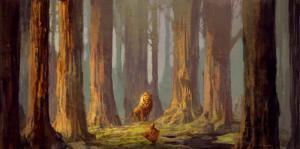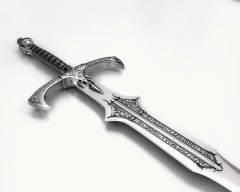
Truthfully? I don’t know.
All right, I know how I myself define Christian fantasy, let’s put it that way. But a clear-cut definition that pleases everyone? Not sure that will ever happen.
So, here’s what I think: I think a Christian fantasy story can be one of a few things. For now I’m going to assume that you are as familiar with “fantasy” books as I am, and we will skip the “fantasy” definition and move right along to what makes a book a “Christian” fantasy. Shall we?
1. A fantasy story that has parallels to Christianity.
There are many stories we could look at in this way – even stories that the author herself may not have intended to write from a Christian worldview at all. Perhaps the author wasn’t even a Christian! I think of books like Harry Potter (which, let’s face it, has a lot of Christian parallels if you look at it at the right angle), or even the Lord of the Rings trilogy (although Tolkien himself specifically said this book was not based on Christianity). Did the authors intend these books to symbolize Christ or Christianity? No. Can we as readers see and enjoy the parallels in these beloved stories that compare to our own Christian walk? Yes!
2. A fantasy story that has intentional Christian symbolism in its characters or theme.

Think of Lewis’ Narnia, think of Anne Elisabeth Stengl’s Heartless. There are characters who represent me and you, human and faulted. And there is the One over them all who makes everything right in the end, who reveals to us the characteristics that we as Christians know our God Himself possesses. For some (mostly non-Christian readers), this type of symbolism is too much – too obvious or “preachy.” Me, I like it. Hey – I write it! It gives me a premise I know already, the foundation of a spiritual world I cannot see but which is around me every day, and then inserts characters and situations that are adventuresome and intriguing. Yeah, there’s symbolism – no one’s arguing that. But it’s meant to be obvious, it’s meant to take something you’ve thought of a thousand times and make you see it in a new light.
3. A fantasy story where God is simply represented as Himself, with no parallels or symbolism.
Ok, I’ll admit, I have yet to read a story like his, although I have seriously considered writing one myself. I have heard of one or two books like this, which are fantasy stories that include God as we know Him. Have you read anything similar? Let me know – I’d love to read it, too!
4. A fantasy story where, even if a God-like character does not exist, true biblical values are made obvious in the book’s theme because of the author’s worldview.
This one is much more subtle. What we as Christians call “biblical” values and truths are sometimes claimed by the world as well. Truth, honor, integrity, patience, love … these were created by God, my friend, and without Him they have little value. But some books that include these virtues would require quite a stretch of imagination to label as “Christian.” These virtues, therefore, aren’t the sole criteria for a book to be “Christian” fantasy. So, the final judgment would have to be based on the individual book, and on the author’s worldview and intention in writing it.
I think it’s important to note that there are a multitude of books out there, fantasy and otherwise, that have religious symbolism, even books that have a God-figure in them. This most definitely does not make them Christian. If a book has a world with parallels to Christianity, it needs to be based on what the Bible defines as Christianity. If a book has a character that represents God, he needs to show God’s real attributes as revealed in the Bible itself. The Golden Compass is a good example of the opposite of this – religious symbolism gone wrong.
Those are my definitions, faulty though they may be. It’s a tricky thing, trying to pin down a definition for something so wide and deep. What do you think? Do you have your own definition of what a Christian fantasy should be? I’d love to hear it!


 newest »
newest »
 newest »
newest »
 God pictured as Himself in a fantasy novel? Hmm, I think Chronicles of Narnia counts. There, Earth was part of many worlds, and Aslan told the children they must come know him by a different name in their world. And at the end the series, he stopped looking like a lion, but something more wonderful...
God pictured as Himself in a fantasy novel? Hmm, I think Chronicles of Narnia counts. There, Earth was part of many worlds, and Aslan told the children they must come know him by a different name in their world. And at the end the series, he stopped looking like a lion, but something more wonderful...
 What a great post! I agree with you and like your definition of "Christian fantasy," for that is how I see it.
What a great post! I agree with you and like your definition of "Christian fantasy," for that is how I see it.  Sarah wrote: "What a great post! I agree with you and like your definition of "Christian fantasy," for that is how I see it.
Sarah wrote: "What a great post! I agree with you and like your definition of "Christian fantasy," for that is how I see it. 






